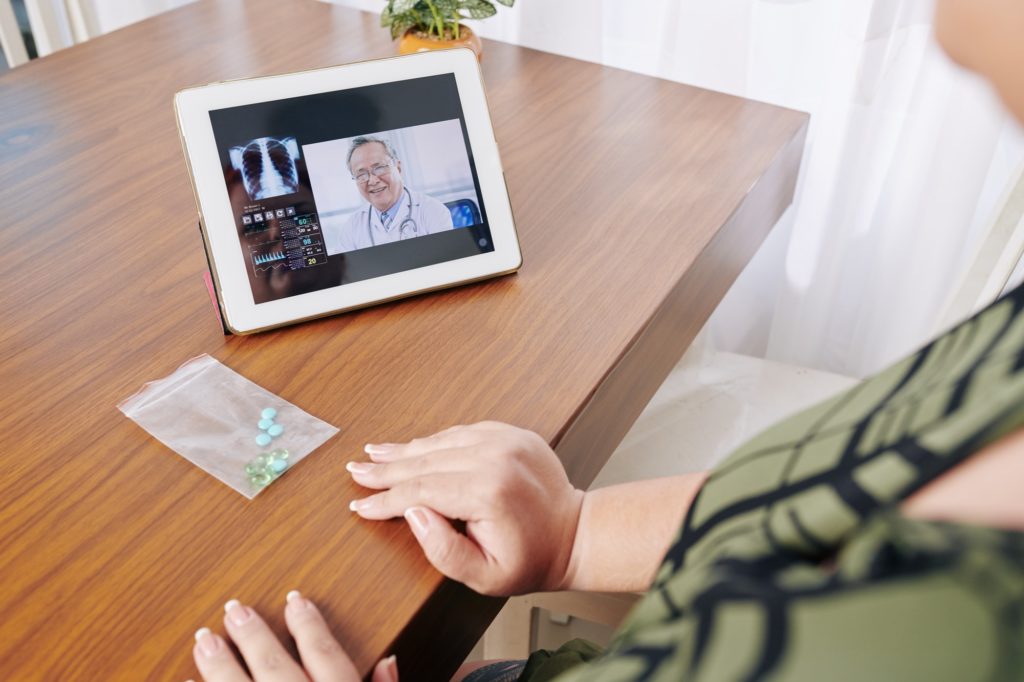Odds are you may have never heard of telemedicine, but it’s actually been around for quite some time. Telemedicine is when someone receives healthcare advice, diagnosis, or treatment without being physically present.
Telemedicine goes back to the 1950’s, and NASA was one of the first big adopters. Astronauts in space don’t usually have a doctor on-hand and must relay their conditions back to medical staff on earth.
Telemedicine is practiced over the phone, through text messages, video chat, or just about any other telecommunications medium.
Is Telemedicine Effective?
It’s natural to have some hesitation about seeing a doctor without actually seeing a doctor. Doctors poked and prodded us our entire lives in the exam room and we’ve come to associate that with our perception of proper healthcare.
It’s no surprise then, that many folks simply aren’t aware of the effectiveness of telemedicine. We did some research and it turns out, it really depends on what specifically you need. Unfortunately, not all healthcare needs can be met remotely.

Psychiatric Help & Counseling
By far, counseling and psychiatric care are some of the most effective types of healthcare to practice remotely. For those who need counseling services, there are plenty of options that don’t require you to sit on a couch in an office. Many online therapy providers even have smartphone apps their patients can use to interact with their counselors.
Since these types of services typically rely on a patient communicating how they feel, they’re a prime candidate for being practiced over video chat, telephone, or even text messages.
For psychiatry services, studies have actually shown little or no difference in the effectiveness of remote treatment compared to traditional in-office methods[1].
Medical Diagnosis for Illnesses
While doctors typically can’t do blood tests or physical exams remotely, much of what a doctor relies on for a diagnosis is based on what the patient tells them. In fact, one of the big complaints from doctors is that patients say, “I feel fine” instead of really laying out their symptoms.
At the least, a telemedicine doctor can provide a preliminary diagnosis and determine if an in-office visit is required. It turns out that about 80% of diagnoses can be made just by talking and making sure the doctor listens[2].

When Telemedicine Gives Way to Office Visits
As we mentioned earlier, not all healthcare needs lend themselves to remote options. Physical exams for example, require a physician to touch the patient. There’s no online replacement for, “turn your head and cough”.
Stress tests and physical therapy are other examples of healthcare needs that would typically require an in-office visit with the right medical professional. Similarly, most diagnostic tests can’t be completed remotely.
Health Insurance Coverage for Telemedicine
The bad news is that whether your current healthcare plan covers remote providers or not will vary. Some insurance companies will happily cover services while others only do so if a local option isn’t available. Still others won’t cover them at all under any circumstance.
The goods news is that telemedicine is a rapidly growing industry. As a result, it’s only a matter of time before insurance companies begin to view them as ‘just another doctor’ instead of something to be scrutinized because it’s different.
Final Thoughts
Telemedicine may not be the most well-known healthcare option, but in some circumstances it can be as good as traditional medicine. Being able to get the care you need remotely can open you up to providers you never expected you’d have access to – and more options means you have a better chance at finding the one that’s right for you.
Sources & Additional Reading
1. US National Library of Medicine | National Institute of Health: Effects and Effectiveness of Telemedicine
2. WebMD: How to Talk to Doctors When They Don’t Listen
I'm an aspiring writer from Santa Monica, CA who writes about a little bit of everything. I love paranormal stuff, working out, nature, wildlife, and general humor.


